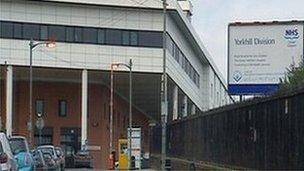Board fined over asbestos at Royal Hospital for Sick Children at Yorkhill
- Published

Scotland's largest health board has been fined £6,000 for failing to clear asbestos from the Royal Hospital for Sick Children at Yorkhill in Glasgow.
NHS Greater Glasgow and Clyde (GGC) admitted flouting asbestos regulations by having poisonous fibres in a basement plant room at the hospital.
Glasgow Sheriff Court heard the board took no action after a low risk problem was highlighted in a survey in 2009.
It was assessed as high risk in 2011, by which time staff had been exposed.
The court heard that a survey in February 2009 had shown there was the presence of asbestos containing materials (ACMs) in a number of places within the plant room. It said that they were in good condition and were a low risk.
Sealed off
The survey recommended the ACMs should be labelled and monitored so any future deterioration could be managed.
In January 2011, a further survey of the plant room was carried out before the installation of a new MRI scanner at the hospital.
This found that some of the ACMs were in a poor condition and now posed a high risk.
The matter was reported to the Health and Safety Executive (HSE) after air and swab samples for asbestos fibres came back positive and the plant room was sealed off.
An investigation by the HSE found that the health board had taken no action since the 2009 survey to monitor the ACMs within the plant room.
No labelling of the ACMs had taken place and nothing had been done over the following two years to maintain the materials in good condition.
The 2011 survey showed their condition had deteriorated - from good and low risk to poor and high risk - but it was not known exactly how or when they had been damaged.
Employees of the health board and outside contractors regularly had to access the plant room and could have potentially been exposed to the harmful asbestos fibres while carrying out maintenance work.
Managers at the health board were interviewed under caution by HSE officials about contamination of areas within the hospital.
The matter was reported in October 2011 by the HSE.
HSE Inspector Eve Macready said: "The dangers posed by the presence of asbestos are clear. There is no known safe limit and it is often many years after exposure before asbestos-related diseases appear - so it is important that exposure to asbestos fibres is kept to an absolute minimum.
"Glasgow health board failed in its duty to properly manage the risks of asbestos in its premises and as a result a number of employees and external contractors have potentially been exposed to harmful fibres."
Renewed policy
Peter Gray QC, representing the health board, told the court that the estates officer for the health board had "very significant attendance issues and personal issues".
He said it was clear that the asbestos policy had not been implemented properly.
The QC said it was "equally clear" that the failures had not been detected by management.
Mr Gray told the court a number of changes had been made, including a renewed policy.
Following the case, NHS GGC said: "We accept that in this instance our robust asbestos procedures fell short of the standards we strive to maintain and the sheriff's decision to issue a fine.
"We have taken rigorous action to reinforce our asbestos procedures including reviewing our policy.
"We have also created a dedicated post, which is currently being advertised, to ensure our asbestos procedures are fully adhered to."
Asbestos was widely used in industry due to its insulation and heat and fire resistant qualities.
It was banned in the UK after it emerged exposure to the substance could cause serious health problems.
Legal requirements are in place to strip asbestos out of old buildings.
It was previously reported that 58-year-old Dr Kieran Sweeney died in 2009 of mesothelioma, caused by exposure to asbestos, while working as a junior doctor at the city's Southern General Hospital in the 1970s.